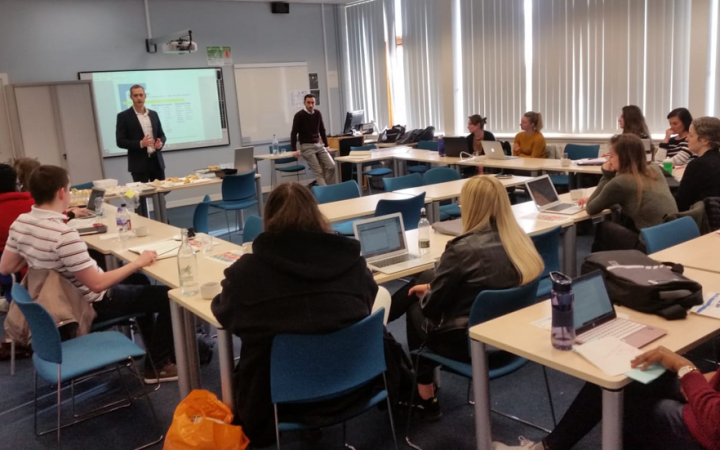Setting the Foundation Stone
4-6 February 2020, Stirling, United Kingdom – For three days, 26 Masters in Diplomacy and Human Rights students from the University of Stirling welcomed five UNITAR staff members, including the director of the Multilateral Diplomacy Division, Mr. Rabih Haddad, who provided their extensive knowledge on a range of issues related to the architecture of Human Rights institutions within the UN system, as well as the UN mission and hiring mechanism.
The three-day workshop’s intensity could only be compared to the vast array of knowledge provided to the students. The professionalism, clarity, and dynamism of the five trainers created an open and comfortable learning environment, in which it could not be said that any student left the workshop feeling less clear, confident, and motivated on the UN’s central role in Human Rights advocacy.
No details were left behind during the planning process: UNITAR aimed to provide a structured, fluid, and easy-to-follow experience on a topic which many consider to be complex and overwhelming. The students’ curiosity and ability to retain all the relevant information demonstrates that UNITAR succeeded in communicating the topics in an accessible and constructive manner.
The timing of the event could not have been any more convenient: following the widely discussed World Economic Forum 2020, which took place only a week before, Mr. Haddad inspired a wave of engagement in the students by combining the hot topics discussed at the WEF with insights from his own experience during his session on Current and Future Problems Faced by the UN.
Worthy of mention is the degree to which UNITAR’s ability to provide a holistic picture to the students played a central role in the workshop’s success: topics spanned from the role and scope of the UN Charter, the UN system, the role of treaty bodies, and the Human Rights Council to the future of Human Rights protection.
The synergetic relationship between theory and practice has always been epitome of UNITAR’s teaching philosophy. This workshop was no exception. Much to the delight of the students, the UNITAR trainers complemented the theoretical foundation of the first two days with invaluable practical insights on the hiring system of the UN, covering in-depth the UN system’s application procedures.
The knowledge provided during the workshop has provided the students with a strong foundation on which UNITAR will continue adding value during Stirling’s visit to Geneva in the summer of 2020, after which many of the students will immediately begin their internships in the field of Human Rights.
The success of this event mirrors the encouraging results of previous engagements. Providing quality education is a Sustainable Development Goal which is central to UNITAR’s philosophy, and which it wishes to share with any institution interested in boosting their International Relations programmes.


